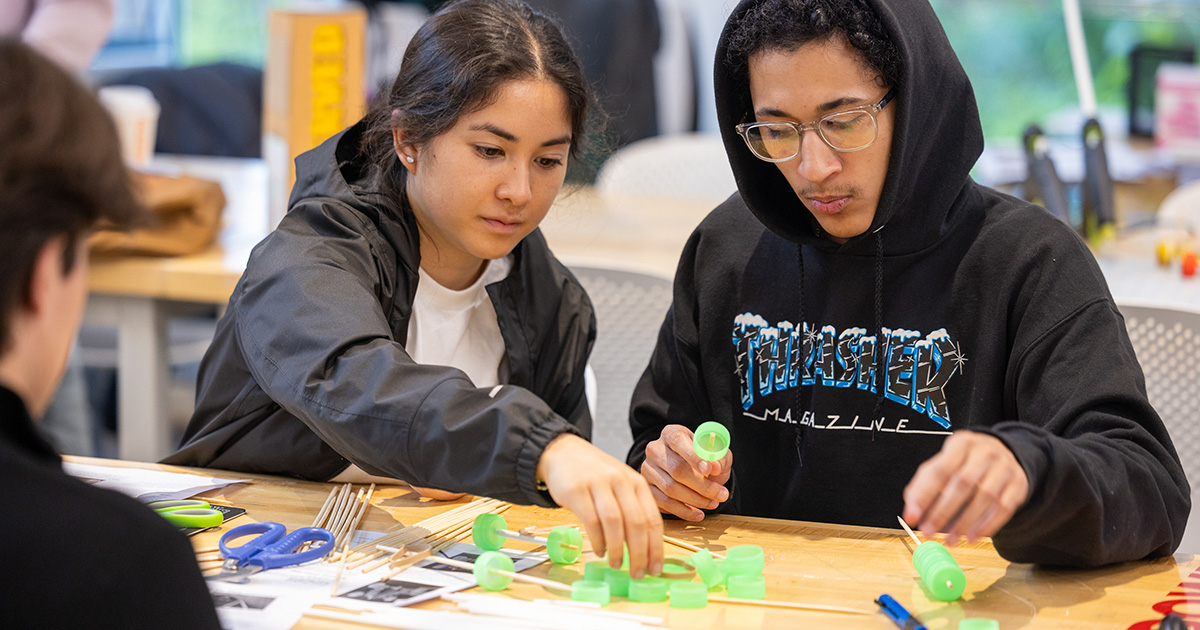Sustainability Key to Babson Collaborative Global Student Challenge Winners
Students from around the world—including Norway, Lebanon, and Chile—visited Babson’s Wellesley campus last week after winning the 2022 Babson Collaborative Global Student Challenge.
Graduate and undergraduate students from 17 countries attending 25 member schools affiliated with the Babson Collaborative for Entrepreneurship Education were charged with creating a feasibility analysis for a new business concept that addresses one or more of the United Nations’ Sustainable Development Goals (SDGs). The SDGs are detailed in 17 categories such as eliminating poverty and hunger, ensuring access to clean water, and combating climate change.
The Babson Collaborative Global Student Challenge has engaged more than 3,400 students and produced more than 900 new business concepts addressing the SDGs since 2018. The 2022 winners of the challenge earned a scholarship to attend Babson Build, a weeklong entrepreneurship boot camp on Babson’s campus.
Bachelor’s Challenge Winners
First place — Miido. Nicolás Castellón and Benjamín Martínez from the Universidad del Desarrollo in Chile created Miido, a real-time information system that details the state of soil nutrients so farmers don’t have to overuse fertilizer or other additives that pollute the water.
Second place — UWYTA: Upcycle What You Throw Away. Jad Akl and Margot Wehbe from the Holy Spirit University of Kaslik in Lebanon created UWYTA, which upcycles snack bags and candy wrappers into affordable and fashionable eco-friendly products such as aprons, tote bags, and more.
Third place (tie) — Salvus. Ena Kontic and Youssef Ahmed Salaheldin from TBS Education in France created Salvus, a walking map application that helps local and foreign pedestrians find the safest route to their destinations.
Third place (tie) — SubCleanse. Lene Øy and Markus Marchel Wahlen from Nord University in Norway created SubCleanse, a remotely operated underwater vehicle that cleans the seafloor under the fish cages, helping farmers control the environment and keep production sustainable.
Master’s Challenge Winners
First place — Acoustic Design. Hugo Furnes, Ingrid Dahl Nilsen, and Sjur Filip Vik Haakestad from the Norwegian University of Science and Technology created a feasibility analysis for Acoustic Design, a company focused on using art and sound-absorbing panels with sustainable materials such as wool to reduce noise pollution.
Second place (tie) — INPOWER. Jimena Cordova, Iván García, Mishell Maldonado, Hildegard Melendez, Arianne Nieto, and Alejandra Palao from EAE Business School in Spain created INPOWER, which seeks to reduce employment inequalities for people with disabilities, giving their skills and talents more visibility and empowerment in the work environment.
Second place (tie) — Vassie. Martha Castro, Rodrigo de la Piedra, Luis Figueroa Luna, Fernando Mañá, Carlos Rubio, and Melissa Valencia from EAE Business School created Vassie, which aims to transform consumption habits by reducing the number of to-go cups in a sustainable way.
Posted in Babson Briefs



